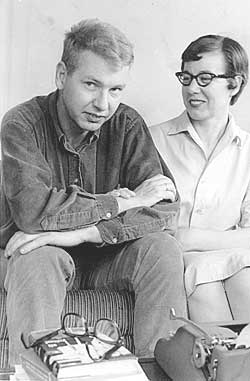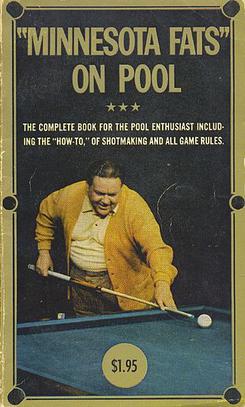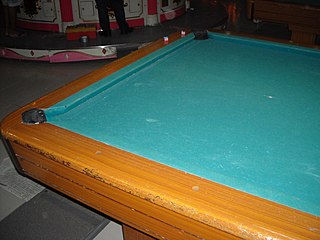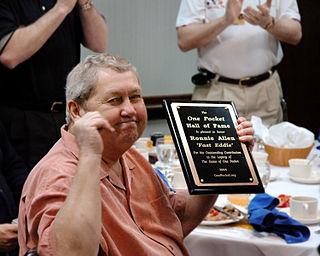
Nine-ball is a discipline of the cue sport pool. The game's origins are traceable to the 1920s in the United States. It is played on a rectangular billiard table with pockets at each of the four corners and in the middle of each long side. Using a cue stick, players must strike the white cue ball to pocket nine colored billiard balls, hitting them in ascending numerical order. An individual game is won by the player pocketing the 9-ball. Matches are usually played as a race to a set number of racks, with the player who reaches the set number winning the match.

Alvin Clarence Thomas was an American gambler, golfer, and hustler, who killed five men but was never charged with a crime, better known as Titanic Thompson.

The Hustler is a 1959 novel by American writer Walter Tevis. It tells the story of a young pool hustler, Edward "Fast Eddie" Felson, who challenges the legendary Minnesota Fats.

The Color of Money is a 1986 American sports drama film directed by Martin Scorsese and released by Touchstone Pictures. The film was created from a screenplay by Richard Price, based on the 1984 novel of the same name by Walter Tevis. The film stars Paul Newman and Tom Cruise, with Mary Elizabeth Mastrantonio, Helen Shaver, and John Turturro in supporting roles. It features an original score by Robbie Robertson, and was released on October 17, 1986, after a premiere a week earlier at the Ziegfeld Theater in New York City in New York. The film grossed $52.3 million at the box office.

Walter Stone Tevis was an American novelist and short story writer. Three of his six novels were adapted into major films: The Hustler, The Color of Money and The Man Who Fell to Earth. A fourth, The Queen’s Gambit, was adapted into a miniseries with the same title and shown on Netflix in 2020. His books have been translated into at least 18 languages.

William Joseph Mosconi was an American professional pool player from Philadelphia, Pennsylvania. Mosconi is widely considered one of the greatest pool players of all time. Between the years of 1941 and 1957, he won the World Straight Pool Championship nineteen times. For most of the 20th century, his name was essentially synonymous with pool in North America – he was nicknamed "Mr. Pocket Billiards" – and he was among the first Billiard Congress of America Hall of Fame inductees. Mosconi pioneered and regularly employed numerous trick shots, set many records, and helped to popularize pool as a national recreation activity.

Rudolf Walter Wanderone, commonly known as Minnesota Fats, was an Swiss-American professional billiards player. Although he never won a major pool tournament as "Fats", he was at one time perhaps the most publicly recognized pool player in the United States—not only as a player, but also as an entertainer. Wanderone was inducted in 1984 into the Billiard Congress of America Hall of Fame for his decades-long public promotion of pool.

Straight pool, which is also called 14.1 continuous and 14.1 rack, is a cue sport in which two competing players attempt to pot as many billiard balls as possible without playing a foul. The game was the primary version of pool played in professional competition until it was superseded by faster-playing games like nine-ball and eight-ball in the 1980s.

One-pocket is a pool game. Only one pocket for each player is used in this game, unlike other games played on a pool table where any pocket can be used to score object balls. The object of the game is to score points. A point is made when a player pockets any object ball into their designated pocket. The winner is the first to score an agreed-upon number of points.

A card sharp is a person who uses skill and/or deception to win at poker or other card games. "Sharp" and "shark" spellings have varied over time and by region.

A billiard, pool or snooker hall is a place where people get together for playing cue sports such as pool, snooker or carom billiards. Such establishments commonly serve alcohol and often have arcade games, slot machines, card games, darts, foosball and other games. Some billiard halls may be combined or integrated with a bowling alley.

Poolhall Junkies is a 2002 comedy-drama thriller film co-written, starring and directed by Mars Callahan. It is the story of a pool hustler who is opposed by his former mentor, with a new prodigy, in a climactic big-stakes nine-ball match.
Don Willis was a colorful pool hustler from Canton, Ohio who was considered one of the greatest money players of all time. In the late 1940s and 1950s, when pool was in decline and cash prizes for pool tournaments did not pay enough for a full-time income, Willis chose to travel America playing private pool games for money alongside world champion Luther Lassiter.

Minnesota Fats, or George Hegerman, is a fictional pool hustler created by American novelist Walter Tevis. The character appears in Tevis' novel The Hustler (1959). Jackie Gleason portrayed the character in the 1961 film adaptation of The Hustler, a performance that received several awards and nominations.

The Hustler is a 1961 American sports romantic drama film directed by Robert Rossen from Walter Tevis's 1959 novel of the same name, adapted by Rossen and Sidney Carroll. It tells the story of small-time pool hustler "Fast Eddie" Felson and his desire to break into the "major league" of professional playing and high-stakes wagering that follows it. He throws his raw talent and ambition up against the best player in the country, seeking to best the legendary pool player "Minnesota Fats".

Keith McCready is an American professional pool player who played under the nickname "Earthquake". At one time considered among the top players in America, McCready has been a traveling tournament competitor and notorious hustler since the 1970s. Known for comedically interacting with the audience during matches, McCready was also a contributing writer for InsidePool magazine between 2003 and 2006. He also had a supporting role as the hustler Grady Seasons in the 1986 film The Color of Money.

William "Bill" Paul Staton, was an American professional pool player and restaurateur, nicknamed "Weenie Beenie". Born Billy Paul Staton, he changed his name to William Paul Staton in the 1970s. He was the ninth and last child of Dexter Ellison Staton and Suda Bertha Moore Staton of the Brown-Norcott community of Concord, North Carolina.
The Color of Money is a 1984 novel by American novelist Walter Tevis. It is the sequel to his 1959 novel, The Hustler. It was his sixth and final book before his death in the year of publication.
Billy Joe "Cornbread Red" Burge, was an American pool player. Inducted into the One-pocket Hall of Fame in 2004 and the Bank Pool Hall of Fame in 2005, Cornbread Red is revered as "one of the most talented characters in the history of pool" and considered as one of the hustlers.

Ronnie Monroe "Fast Eddie" Allen was an American professional pool player. He was labeled as a pool "super star" in the prime of his pool-shooting career by his peers during pool's golden era.

















